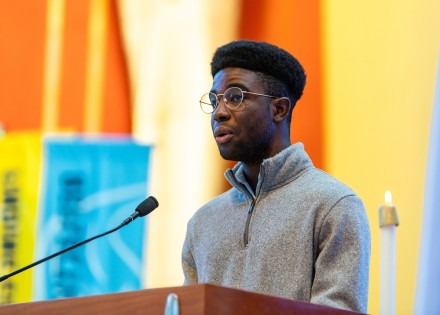The Diversity, Equity and Inclusion Undergraduate Certificate is for students to learn how to engage in reflection upon their own cultures and identities, and identify and analyze their implicit biases. Students will be able to explain the historical, political, social and economic contexts that influence institutions, societies and human life. This program teaches students how to correlate diverse and inclusive populations within organizations and societies with improved social and economic outcomes.
Individuals will learn how to develop a plan to promote diverse, equitable and inclusive environments, communities and organizations. The program promotes a more inclusive campus and community by educating students on topics related to culture, racial relations, discrimination prevention, intercultural competency, and implicit bias, as well as promoting inclusivity and belonging.


Program Overview
Rockhurst's Diversity, Equity and Inclusion Strategic Plan calls for engaging students, faculty, staff, alumni, neighbors, community partners and friends of the University in learning varied perspectives related to diversity, inclusion, equity, and social justice. To address this call, Rockhurst created a two-year, educational and scholarship framework focused on increasing learning and understanding, as well as educating on critical issues related to equity, inclusion, social justice and diversity.
The DEI Undergraduate Certificate program is credit-bearing and enhances individuals’ skill sets and career paths in academia, non-profit industries, business, education, public service and healthcare. A DEI Graduate Certificate is also available.
Learning outcomes
Students will:
- Engage in reflection upon their own cultures and identities.
- Identify and analyze their implicit biases.
- Explain the historical, political, social, and economic contexts that influence institutions, societies, and human life.
- Correlate diverse and inclusive populations within organizations and societies with improved social and economic outcomes,
- Develop a plan to promote diverse, equitable, and inclusive environments, communities, and organizations.
Program Requirements
The certificate program requires 15 credit hours of courses, consisting of ED 4340 and 12 credits of the following courses that are already offered at Rockhurst. Up to six credit hours of these courses may be used to fulfill the related hours used in the major. There is also a three-credit capstone course all students are required to take.
Required courses:
- Diversity, Equity and Inclusion Capstone (ED 4340, 3 credit hours)
Students will choose nine credit hours of elective courses from the following:
- Global Issues and Community Health (2)
- Compassionate Listening (2)
- Foundations of Education (2)
- Introduction to Human Geography (3)
- An Ignatian Approach to Difficult Dialogues on Differences & Divisions (1)
- Community Engagement (Prerequisite or Concurrent: Intro to Social Impact Leadership) (3)
- Sociological and Ethical Issues in Sport (3)
- Foundations of Special Education (3)
- Social and Affective Interventions (3)
- The Immigrants’ Experiences in America (3)
- Race and Identity in America (3)
- Religion, Ethnicity and Race (3)
- Christianity and Women (3)
- World Religions (3)
- Women and Science (3)
- Social Class in America (3)
- Women and Literature (3)
- Contest and Sexuality in Early English and Modern Literature (3)
- African American Literature (3)
- Advanced Conversation and Composition I (3)
- Advanced Conversation and Composition II (3)
- Introduction to Hispanic Literature (3)
- Survey of Latin-American Literature I (3)
- Survey of Latin-American Literature II (3)
- Survey of Spanish Literature I (3)
- Survey of Spanish Literature II (3)
- Latin American and U.S. Latina Women’s Literature (3)
- U.S. Latino Literature (3)
- Seminar in Medical Ethics (3)
- Leading Collaborative Change (3)
- Introduction to French Literature (3)
Degree and class descriptions and requirements can be found by clicking on the course catalog listing below:
Additional Degree Info
- Engage in reflection upon their own cultures and identities
- Identify and analyze their implicit biases
- Explain the historical, political, social and economic contexts that influence institutions, societies and human life
- Correlate diverse and inclusive populations within organizations and societies with improved social and economic outcomes
- Develop a plan to promote diverse, equitable and inclusive environments, communities and organizations
- Promotes a more inclusive campus and community by educating students on topics related to culture, racial relations, discrimination prevention, intercultural competency, and implicit bias, as well as promoting inclusivity and belonging.
